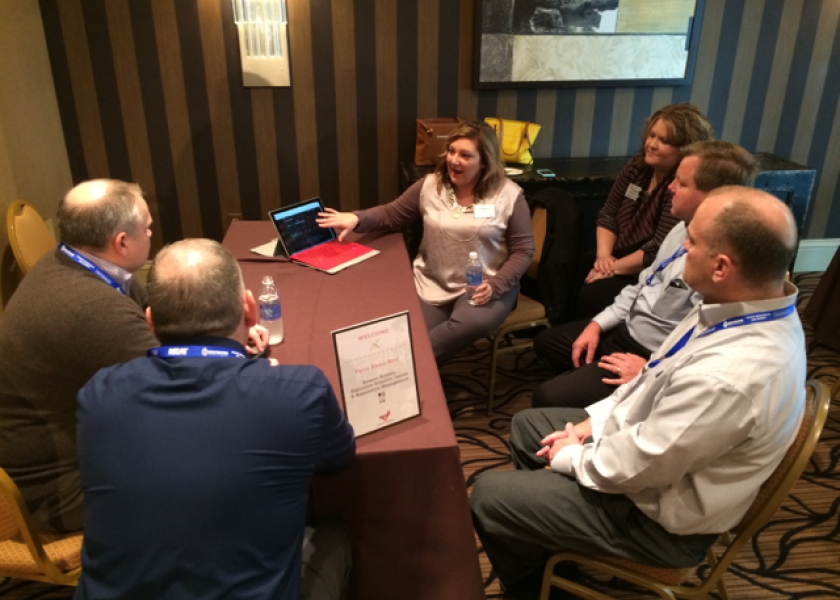Checkoff Highlights Opportunities for Retailers, Foodservice

Representatives of 19 state beef councils also participate in post-conference workshop.
The Beef Checkoff Program was involved in numerous areas of the 2015 Annual Meat Conference in Nashville, Tenn., in late February. Two checkoff-developed educational sessions drew more than 1,000 meat retailers during the event. At “The Changing Face of Supermarket Foodservice and the Keys to Long-Term Success,” the checkoff presented information about the growing opportunity beef has with supermarket prepared foods -- includeing ready-to-eat or ready-to-heat meats at service counters or grab-and-go areas.
Also at the conference, Season Solorio, who leads the checkoff's issues- and reputation-management team, participated in a panel discussion focused on communicating about modern agriculture and sustainability. The panel brought together representatives from the entire agricultural supply chain and covered multi-species, including a pork farmer, a packer and retail and foodservice consultants, to talk about the challenges each segment faces in trying to debunk myths, like "factory farming" and communicating how modern agriculture is more sustainable than it ever was in the past.
The beef checkoff also hosted a beef lunch to give retailers an inside look at the beef market and supply, market intelligence, issues monitoring and culinary opportunities.
“This was a key opportunity for the beef checkoff to reach a select group of retailers that help us market and move product,” said Federation of State Beef Councils Chairman Jennifer Houston, who attended the lunch. Houston is a livestock market operator from Sweetwater, Tenn. “The attendees had a unique opportunity to spend one-on-one time with industry experts to gain intelligence that will help them better sell more beef.”
Representatives of beef councils in 11 states that are active in beef checkoff retail and foodservice efforts participated in the conference: California, Idaho, Kansas, Michigan, Nebraska, New York, Tennessee, Texas, Virginia, Washington and Wisconsin.
“It was great to be in a setting that allows us to build relationships with retailers we deal with on a regular basis – as well as those we’d like to,” said Russell Woodward, senior manager of channel marketing for the Texas Beef Council. “The conference allowed the beef industry to share ideas with retailers and foodservice operators that they could take back to help market beef more effectively in their own operations.”
“The Annual Meat Conference is a chance for the broader beef community to get together,” said Rob Noel, director of channel marketing for the Washington State Beef Commission. “It’s also a rallying point for those who want to market beef more successfully.” Keynote speakers at the event, including Randy Blach of CattleFax, who provided a clear and concise forecast in a well-attended session, gave attendees a foundation for checkoff-based efforts at the event.
Following the conference, representatives from 19 state beef councils attended a two-day workshop hosted by the national beef checkoff at the Tennessee Beef Industry Council offices in Murfreesboro to find out more about beef checkoff-funded retail and foodservice programs and discuss what they can do to extend beef partnerships and educational efforts to retailer and foodservice folks in their states.
Designed specifically for state beef council staff, the workshop provided staff with more insights about the retail/foodservice environment, an understanding of the segments' strategic framework, engagement and information about content resources available. The workshop served as a valuable opportunity for state and national checkoff teams to come together, exchange knowledge and share success stories.
In addition to the states who participated in the Annual Meat Conference, beef councils from Arkansas, Florida, Indiana, Kentucky, Minnesota, North Carolina, Ohio and Pennsylvania sent representatives to the workshop.
“It was valuable to learn where we’re headed in terms of promoting beef through retail and foodservice,” said Kaye Strohbehn of the Minnesota Beef Council. “More than that, though, it was great to have an opportunity to engage with our national team members, as well as our counterparts at other state beef councils, to find ways to work together and leverage our resources to help build beef demand throughout the United States.”
Source: Cattlemen’s Beef Board







